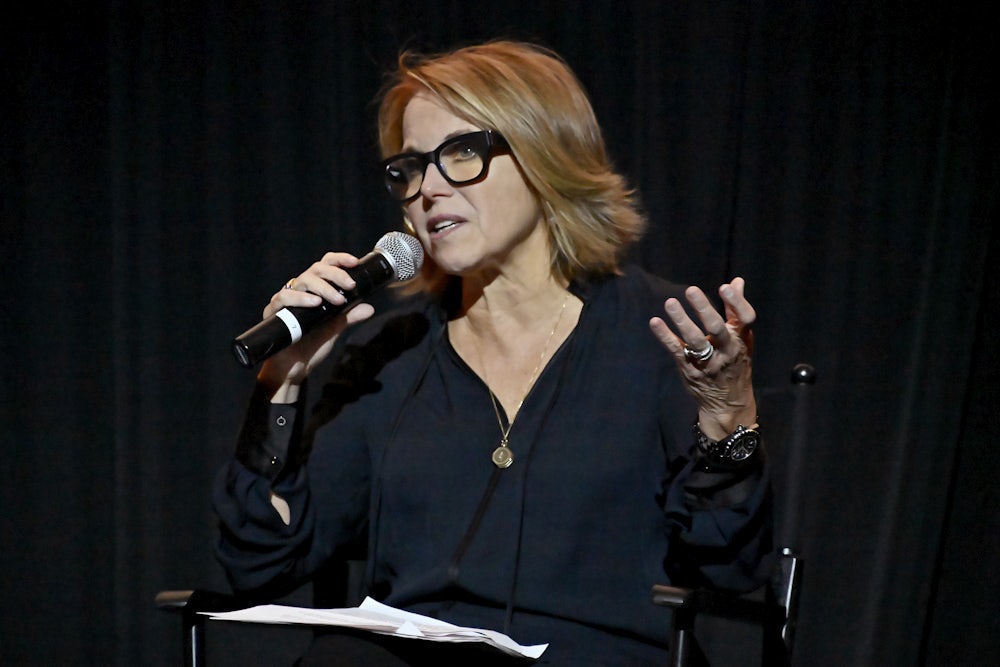Back in 2016, prominent television journalist Katie Couric scored herself a lengthy and exclusive sit-down with then–Supreme Court Justice Ruth Bader Ginsburg. The interview, conducted when the former news anchor was working for Yahoo News, yielded a 29-minute video and web feature, covering topics ranging from the justice’s refusal to retire to her fabled friendship with former Justice Antonin Scalia, to the state of national politics. But it was the segment on race that received the most attention. Specifically, Ginsburg’s dismissal of San Francisco 49ers quarterback Colin Kaepernick’s protests against the extralegal police killings of Black men as “dumb and disrespectful,” which prompted such a hue and cry at the time that the then 83-year-old justice was compelled to offer a meek apology.
But according to Couric’s upcoming memoir, that wasn’t exactly the end of the story—and now she is rightly under fire. Couric apparently pulled the rest of Ginsburg’s answer, in which she expressed her disapproval of athletes “taking the knee,” from the final cut of the interview—an apparent effort by the self-proclaimed “big RBG fan” to protect the aging justice from harsh pushback. It’s an ethical failure so gobsmacking that it’s tough to understand why Couric would disclose it at all, let alone do so as advance publicity for a forthcoming autobiography. What’s even more absurd is the way she is framing this anecdote as some tough professional call she had to make. It was anything but: Withholding this footage was an obvious, almost canonical lapse in journalistic ethics—and a profound betrayal of the public.
The comments that Couric surreptitiously axed were arguably more incendiary—and more racist—than the ones that survived the friendly editing process: Ginsburg apparently said that Kaepernick and his allies showed “contempt for a government that has made it possible for their parents and grandparents to live a decent life, which they probably could not have lived in the places they came from … as they become older they realize that this was useful folly. And that’s why education is so important.”
That’s considerably more callous and reactionary than Ginsburg’s previously known position on the matter: that however dopey their actions may have been, the athletes had every right to take them. It implies not only that Black people have little right to feel anything less than profound gratitude to the country that enslaved, exploited, and systemically impoverished them but that they haven’t learned enough to understand that they’re ultimately outsiders from Africa.
As Couric herself conceded, the justice celebrated for her legal accomplishments on gender equality had “a blind spot” when it came to racial justice. On her decision to yank the money quotes out of the televised interview, Couric was less forthcoming: Ginsburg was elderly, she reasoned, and probably didn’t understand the question.
Clearly, that’s hogwash. Ginsburg spent several minutes in the original video unpacking her thoughts about race and policing; the omitted portion flowed naturally and coherently from the points she’d already made. She understood the question perfectly well and provided a thorough response; it just happened to be an abysmal one. And Couric fully understood that she was sitting on some combustible cringe: She knew her idol’s words would become a major story, far more than the moderate controversy that followed the version that was released—so she quietly made it go away.
Couric was right about one thing: Ginsburg’s condescending comments really did piss people off, as the reaction to these revelations shows. Others, however, have expressed something closer to confusion: How surprised should we be that an 83-year-old woman had some racist ideas? Are we really going to cancel a dead Supreme Court justice? And ultimately, what do Ginsburg’s personal opinions really matter, anyway? As justice reporter Elie Mystal put it on Twitter, “You know why RBG’s stance on Kaep doesn’t matter to me? Because if there was a case involving his or anybody else’s right to protest, she’d be on the right side of it. I don’t need elderly white judges to ‘get it,’ I need them to get the law, and apply it fairly.”
Strictly speaking, Mystal is correct: Ginsburg did stress, repeatedly, that even protests she vehemently disagrees with must be protected by law. The expectation that octogenarian Supreme Court judges will harbor personal thoughts indistinguishable from those of left-wing Zoomers is surely one that’s doomed to fail. And whether or not one cares about what Ginsburg said isn’t particularly actionable either way, given the fact that she’s dead!
None of this lets Couric off the hook, however. Ginsburg certainly wasn’t dead in 2016; nor was the memefied squee cult that arose around the so-called “Notorious RBG” to consume the ubiquitous branded merch with her face stamped all over it. All of that hero worship served a political end, and a deeply pernicious one at that: In retrospect, Ginsburg’s refusal to retire back when Democrats still held the Senate (and Ginsburg herself was a two-time cancer survivor pushing 80) may well have been at least partially a response to her newfound liberal celebrity—and the fawning biography, children’s books, and feature documentary that came with it. If not, the hagiography—in which Couric was an admitted participant!—certainly warped the public’s understanding of RBG as a full political actor, which Supreme Court justices undeniably are.
The clips that Couric shielded from public view are relevant here: Ginsburg may indeed have ruled on the side of lawful protesters, but as the Marshall Project noted, her record on police powers and criminal justice was far more mixed. And however one might feel about how her personal opinions may or may not have bled into her interpretations of the law, the public’s right to know what one of the single most powerful government officials says to a journalist about one of the most consequential issues in American life exists in its own right.*
This is not merely an issue of Ginsburg’s personal opinions and the extent to which they upset people. Couric concealed information about a far more important matter than Ginsburg’s legacy: the nature of the Supreme Court and the federal judiciary itself. What does it say about an institution that its ballyhooed liberal standard-bearer—whose lifetime appointment makes her democratically accountable to no one—casually denounces protests against racist state violence? And what does it say about the media and our political culture writ large that an individual justice was so revered that a major journalist suppressed her actual words to preserve her status as a legendary icon of the resistance? Nothing good, I suspect. But that’s for the public to decide. Couric should have allowed it to do so.
* This post originally mischaracterized Ginsburg’s status as an appointed member of government.










